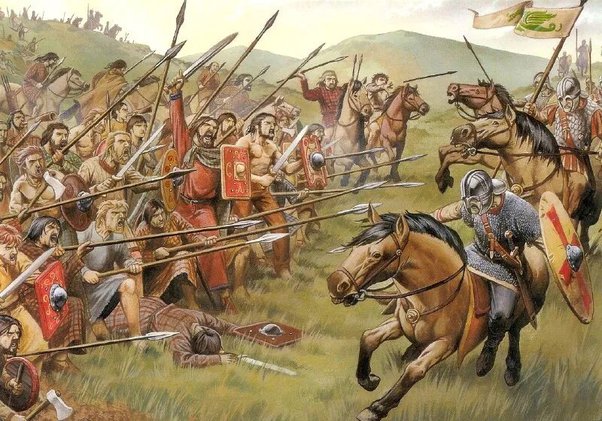The Advent of the Anglo-Saxons 1: Conquest

In the 6th century a British priest named Gildas wrote a jeremiad against the corrupt and decadent rulers of his people. According to Gildas the sins of the rulers of the Britons had borught God’s vengeance upon them and their realms. Vengeance came in the shape of blond-haired, moustachioed warriors. The book Gildas wrote was called De Excidio Britanniae (On the Ruin of Britain) and it’s the only contemporary source we have for what happened in Britain in the 5th and 6th centuries.
Those warriors were Angles and Saxons and Jutes. They were Germanic-speaking peoples who came from the flat, marshy regions of what are today northern Germany and southern Denmark. Gildas said they had been invited to the country as mercenaries and then had turned on their employer. In some manuscripts, that king was named Vortigern. The mercenaries began carving out their own kingdoms, dispelling the native Britons and replacing them with their own people, sailing the grey whale road over the storm-tossed waters of the North Sea.
The advent of the Anglo-Saxons was elaborated in later accounts. The anonymous leaders of the original band of mercenaries became the brothers Hengist and Horsa, who landed with their men at Ebbsfleet on the Isle of Thanet. There is archaeological evidence for a Germanic presence in Kent in the early 5th century. Excavated burials have found the bodies of men kirtled with the typical Germanic belt worn by mercenaries working for the Romans.
According to Bede and the Anglo-Saxon Chronicle, the German mercenaries were first recruited to fight the Picts. There had been Pictish incursions into Roman ruled Britain even in the days of the Empire. But when the mercenaries saw that the land they’d come to was rich while the Britons required others to fight for them, they sent messengers to their native lands, calling for reinforcements. Hengist and Horsa claimed that the country was ripe for the taking. In 455, battle was joined. Horsa died, but Vortigern was defeated and Hengist established himself as king of Kent. Later chroniclers embellished the story, telling how Vortigern became infatuated with Hengist’s daughter, Rowena, and how the girl, working with her father, manipulated Vortigern into giving Hengist and his men more territory in return for her hand in marriage. Thus Britain was lost to the Britons through the lust of one man.
For Gildas, the adventus Saxonum, the coming of the Saxons, was an unmitigated disaster, though one consequent upon the actions of the tyrants against whom he railed in his book. But if his account gives little detail as to what was actually happening in Britain at the time – there are no dates and only a handful of names – the account itself tells us a lot about what was still possible in Britain around 540, over a century after the Romans had left. It tells us that Britons could still benefit from a classical education, learning Latin and its associated literary culture, as well as being steeped in Biblical texts and exegesis. Gildas was a learned and cultured man, a civilized one in the fullest sense of the term, and for him the Anglo-Saxons were nothing but barbarians: pagan illiterates whose only use for a book was to turn it into kindling.
But Gildas was chiefly concerned with making a point about the immorality of contemporary rulers and the consequences that resulted from their immorality. While his account formed the basis for our early understanding of the advent of the Anglo-Saxons, how accurate was it really? We will look at that in the next feature.
0 Comments